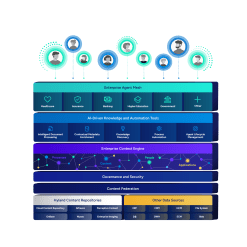Asante
Health system saves $200,000 in one year and cuts processing times 63% to 90% with Hyland’s Intelligent MedRecords.

Harness the power of a unified content, process and application intelligence platform to unlock the value of enterprise content.
Learn more
Automate your document-centric processes with AI-powered document capture, separation, classification, extraction and enrichment.
Learn about Hyland IDPIt's your unique digital evolution … but you don't have to face it alone. We understand the landscape of your industry and the unique needs of the people you serve.
 Overview of industries
Overview of industries
Countless teams and departments have transformed the way they work in accounting, HR, legal and more with Hyland solutions.
 Overview of departments
Overview of departments
We are committed to helping you maximize your technology investment so you can best serve your customers.
 Overview of services
Overview of services

Discover why Hyland is trusted by thousands of organizations worldwide.
Hear from our customers
Our exclusive partner programs combine our strengths with yours to create better experiences through content services.
Overview of partners
Join The Shift newsletter for the latest strategies and expert tips from industry leaders. Discover actionable steps to stay innovative.
Register now
Hyland connects your content and systems so you can forge stronger connections with the people who matter most.
Learn about HylandWith our modern, open and cloud-native platforms, you can build strong connections and keep evolving.
 Dig deeper
Dig deeper
Reading time minutes
Health system saves $200,000 in one year and cuts processing times 63% to 90% with Hyland’s Intelligent MedRecords.

Asante serves patients in nine counties in Oregon and California. The health system includes three hospitals, 40-plus primary care and specialty clinics, and more than 6,000 employees.
The expansive network receives and generates a lot of medical records paperwork — Asante processes about 1.5 million documents a year — creating a strong need for efficient workflows.
Asante had a backlog of documents that eclipsed the combined height of two NBA players.
“During this time of backlog, we had clinics calling us asking us for documents. ‘We need this document in the chart now.’ We were spending 45 minutes to an hour, multiple employees looking for that one document through the 14 feet of paperwork,” said Tatum Beech, Asante’s supervisor of data integrity and health information governance.
The health system had separate teams — each with different workflows — for inpatient and outpatient scanning. Asante attempted to cross-train the groups, but it took six months to get one employee up to speed on the other team’s day-to-day work.
“Our turnaround times for scanning were horrible,” said Jeannie Warren, Asante’s manager of health information services and enterprise data governance. “Our clinic turnaround times were about four months out. For the hospital, we were about 30 days out.”
The delays impacted patient care and healthcare reimbursement.
—Tatum Beech, Supervisor of Data Integrity and Health Information Governance, Asante
Asante selected Hyland’s Intelligent MedRecords (IMR) to automatically read, classify and extract data and integrate medical records within its Epic EHR workflow. The intelligent capture, extraction and validation platform sorts paper and digital documents, and drives the information into OnBase, a Hyland content services platform.
With IMR’s use of AI-based machine learning to automate classifications and extractions, Asante no longer has separate workflows. The health system has one team processing medical records, which is a huge improvement from the cumbersome setup of the past.
One of the biggest time-savers was the ability to create “on-the-fly” encounters in OnBase, based on data extracted from a medical record, rather than having to re-enter it into the EHR.
Amount Asante saved in its first year with automation
Reduction in the time it takes to process 20 pages of records
Reduction in the time it takes to process a faxed document
No backlog: Asante’s initial IMR project involved AI-based machine learning classification of 66 document types. In fewer than six months, the 14-foot-high backlog of documents was gone.
Accelerated processes and reduced costs: In its first year with IMR, Asante saved almost $200,000. And the health system’s time savings might be even more impressive.
Also crucial: Asante isn’t wasting time looking for medical records.
“We no longer have to spend time searching for records because we are within our 24-hour turnaround time,” Beech said. “As soon as that paperwork hits us, we have it scanned in and in the chart and available to providers within 24 hours.”
Improved insights and care decisions: The elimination of processing delays brings timely access to medical records and an enhanced ability to positively impact care decisions.
In the first year, Asante already had 21 of its 40-plus clinics on centralized scanning. The health system’s goal is to have every clinic on board within five years.
“I was a little bit skeptical — I’m not going to lie,” Warren said. “I didn’t think we would see the return on our investment as fast as we did, which was great. We did it a lot faster than planned.”

Automation is a prerequisite to delivering patient-centered care in the post-HITECH era.

Health system relies on Hyland to support enterprise content management needs for nine hospitals and 400-plus points of care.

Delays in medical record processing can be detrimental to patient care decisions, while also failing to meet regulatory requirements and inhibiting cash flow.

Organization achieves 83% faster EHR access to medical records converted from paper.